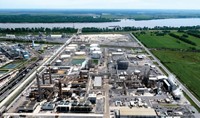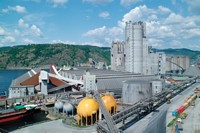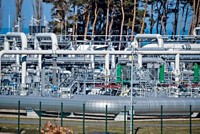Advertisement
Grab your lab coat. Let's get started
Welcome!
Welcome!
Create an account below to get 6 C&EN articles per month, receive newsletters and more - all free.
It seems this is your first time logging in online. Please enter the following information to continue.
As an ACS member you automatically get access to this site. All we need is few more details to create your reading experience.
Not you? Sign in with a different account.
Not you? Sign in with a different account.
ERROR 1
ERROR 1
ERROR 2
ERROR 2
ERROR 2
ERROR 2
ERROR 2
Password and Confirm password must match.
If you have an ACS member number, please enter it here so we can link this account to your membership. (optional)
ERROR 2
ACS values your privacy. By submitting your information, you are gaining access to C&EN and subscribing to our weekly newsletter. We use the information you provide to make your reading experience better, and we will never sell your data to third party members.
Agriculture
Disruptions are reshaping global fertilizer markets
Nutrien is expanding in North America as natural gas prices force a UK fertilizer factory to shut down
by Matt Blois
June 16, 2022
| A version of this story appeared in
Volume 100, Issue 22

The Canadian fertilizer company Nutrien says it will increase production of the potassium fertilizer potash as the war in Ukraine disrupts the supply of fertilizer from Russia and Belarus. The company says it will produce 18 million metric tons of potash annually by 2025, a 40% increase over its 2020 capacity.
“We expect supply challenges across energy, agriculture, and fertilizer markets to persist well beyond 2022,” Nutrien CEO Ken Seitz said during a recent investor presentation.
Russia and Belarus produced about 35% of the world’s potash in 2020, and economic sanctions stemming from Russia’s invasion of Ukraine have made that fertilizer harder to access. Canada produces more potash than any other country, and many countries that previously relied on Belarus and Russia for potash, such as Brazil, are now turning to Canada.
Seitz said he expects those sanctions to have a lasting impact, pushing customers toward more reliable suppliers.
The sanctions are already affecting fertilizer companies with ties to Russia. In March, the European Union imposed sanctions on Andrey Melnichenko, a Russian industrialist who owns the fertilizer producer EuroChem, which has several fertilizer factories in Russia. He resigned and transferred ownership of the company to his wife, but now the EU has placed sanctions on her as well.
David Widmar, co-founder of the research firm Agricultural Economic Insights, says it’s not yet clear how big of an impact the sanctions will have. “We will expect somebody to buy fertilizer from Russia at a given price. The question is, how much?” Widmar asks.
Nutrien is also increasing nitrogen fertilizer production. The company says high prices for natural gas, the main feedstock for nitrogen fertilizers, are also going to shift more nitrogen production to North America, where natural gas is relatively cheap. The company previously announced the addition of 500,000 metric tons of nitrogen fertilizer capacity and is now considering further expansion.
Earlier this month, high natural gas prices forced CF Industries to permanently close an ammonia plant in the UK. The plant hadn’t been producing since September 2021. CF has continued operating a second UK ammonia plant with support from the UK government.
The good news for farmers is that fertilizer prices are starting to level off. For the first time since November 2020, the majority of fertilizer prices tracked by the farming publication Progressive Farmer fell slightly in early June.





Join the conversation
Contact the reporter
Submit a Letter to the Editor for publication
Engage with us on Twitter